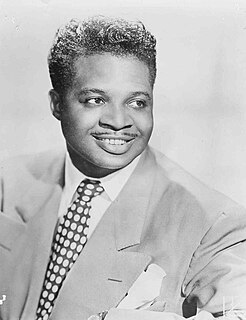
Mathis James Reed was an American blues musician and songwriter. His particular style of electric blues was popular with blues as well as non-blues audiences. Reed's songs such as "Honest I Do" (1957), "Baby What You Want Me to Do" (1960), "Big Boss Man" (1961), and "Bright Lights, Big City" (1961) appeared on both Billboard magazine's rhythm and blues and Hot 100 singles charts.
United Records was a record company and label founded in Chicago by Leonard Allen and Lew Simpkins in 1951.
Cub Records was an American record label, and a subsidiary of MGM Records, which started in 1958 for rhythm and blues releases.

Roy James Brown was an American blues singer who had a significant influence on the early development of rock and roll and the direction of R&B. His original song and hit recording "Good Rockin' Tonight" has been covered by many artists including Wynonie Harris, Elvis Presley, Bruce Springsteen, Paul McCartney, Joe Ely, Ricky Nelson, Jerry Lee Lewis, Pat Boone, James Brown, the Doors, and the rock group Montrose. Brown was one of the first popular R&B singers to perform songs with a gospel-steeped delivery, which was then considered taboo by many churches. In addition, his melismatic, pleading vocal style influenced notable artists such as B.B. King, Bobby Bland, Elvis Presley, Jackie Wilson, James Brown and Little Richard.

Bobby Robinson was an American independent record producer and songwriter in New York City, most active from the 1950s through the mid-1980s.

Ella and Duke at the Cote D'Azur is a 1967 live album by Ella Fitzgerald, accompanied by the big band of Duke Ellington.

Ella Fitzgerald Sings the Duke Ellington Song Book is a 1957 studio album by the American jazz singer Ella Fitzgerald, accompanied by Duke Ellington and his orchestra, focusing on Ellington's songs.

Eskew Reeder, Jr., usually known by the stage name Esquerita, and occasionally as S.Q. Reeder or The Magnificent Malochi, was an American R&B singer, songwriter and pianist, known for his frenetic performances. He has been credited with influencing rock and roll pioneer Little Richard.

Jimmy Liggins was an American R&B guitarist and bandleader. His brother was the more commercially successful R&B/blues pianist, Joe Liggins.
Jimmy Tennant, better known as Jimmy Velvet, was an early American soft rock and roll vocalist, during the 1960s. His most popular singles were "We Belong Together" and "It's Almost Tomorrow".
"Big Boss Man" is a blues song first recorded by Jimmy Reed in 1960. Unlike his most popular songs, the songwriting is credited to Luther Dixon and Al Smith. It was a hit for Reed and has been identified as an influential song. Elvis Presley and B.B. King also recorded hit versions of the tune.

David Eugene Summers was an American rockabilly singer, songwriter and guitarist. His most famous recordings include the late 50s "School of Rock 'n Roll", "Straight Skirt", "Nervous", "Gotta Lotta That", "Twixteen", "Alabama Shake", "Fancy Dan" and his biggest-selling single "Big Blue Diamonds". Summers was inducted into the Rockabilly Hall of Fame in 1997 and the Southern Legends Entertainment & Performing Arts Hall of Fame in 2005. He still performed worldwide and celebrated his 50th anniversary as a recording artist in 2008 with the release of Reminisce Cafe.
"Twixteen" is a song written by Mary Tarver in 1958 and published by Ted Music, BMI. It was first recorded by Gene Summers and His Rebels in 1958 and issued by Jan/Jane Records. The "Twixteen" recording session took place at the Liberty Records Studios in Hollywood, California and featured René Hall and James McClung on guitar, Plas Johnson on saxophone, Earl Palmer on drums, and George "Red" Callendar on bass. The flipside of "Twixteen" was "I'll Never Be Lonely".

Reminisce Cafe is a landmark album by Gene Summers, released in 2008. It is his 50th anniversary album issued by Seduction Records on February 1, 2008, exactly 50 years to the day of the release of his first hit single "School of Rock 'n Roll"/ "Straight Skirt".
Tear Drop Records was a record label founded in Winnie, Texas, United States, in the early 1960s by recording pioneer and radio personality, Huey P Meaux. As a deejay, Meaux was known as the "Crazy Cajun", a name that stuck with him throughout his long, music career.

"Baby What You Want Me to Do" is a blues song that was written and recorded by Jimmy Reed in 1959. It was a record chart hit for Reed and, as with several of his songs, it has appeal across popular music genres, with numerous recordings by a variety of musical artists.

Blues in the Night is a studio album by pianist Sonny Clark, featuring performance by Clark, Paul Chambers and drummer Wes Landers. It was recorded in December 1958, but shelved until being released in Japan in 1979, as GXF 3051. All the tracks can also be found on the compilation Standards. In 2014, it was reissued on a 24-bit remastered CD in Japan, as part of a limited series. The CD also included the six original pieces from The Art of The Trio.










